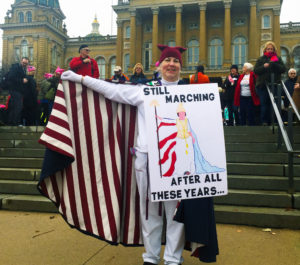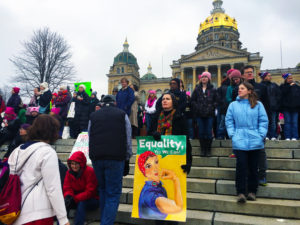A funny thing happened in the wake of last year’s presidential election.
No, it wasn’t that more women signed up to serve as foot soldiers on the political battlefield. They’ve always been there — marching, dialing and door knocking. The humorous part is how some are now surprised, how those individuals have forgotten or never understood herstory.
According to common belief, women are not generally political leaders. We’re told that politics is too nasty a business for most women, or that most women simply aren’t capable of grasping the nuances of public policy. But that only holds true if “being politically active” is defined as giving major speeches or running for elected office.
Women have — for more years than I’ve been walking the planet — served as the backbone of every significant political movement in our nation’s history. Even before suffrage. Without a doubt before Roe v. Wade. Even before a young Carrie Chapman Catt picked apples in her Iowa backyard.

Many men able to drop a ballot in the box last November can thank the women who fought for the 1856 decision that opened voting to all men, even those who didn’t own property, as well as the 15th Amendment of 1870 that expanded male voting rights to all citizens regardless of race or previous status as a slave. Realizing that women’s voting rights would not be possible until all men were permitted, women fought for those changes. It took a lifetime longer — 50 years — before women won the same right for themselves.
Labor reform. Workers’ rights. Abolition. Freedom of religion. Reproductive justice and scientific advancements. (Did you know clergymen argued against pain killers during childbirth on grounds that God commanded children be brought forth in sorrow?) Support for children. Occupational safety reforms. Access to education for all. Environmental regulations. Civil rights and equality. Women were on the forefront of all of these advances and more.
Women pushed. They prodded. They were arrested, and beaten. Hunger strikes resulted in forced feedings.
Nevertheless, women persisted.
They came on horseback, in wagons and on foot by the thousands in 1913 for the first Women’s March on Washington. A decade earlier they organized the female seminary movement, then the Female Labor Reform Association and the American Anti-Slavery Society. Many, many organizations and societies have come and gone — far too many to list here, and not all benevolent.
Despite all of this herstory and experience, however, some remain shocked by the perceived new political activism adopted by women following the election of Donald Trump as president.
Daily Action, a service that texts subscribers with suggested political actions, brought the issue of women activists, particularly middle-aged women activists, to the forefront when it posted the results of an internal subscriber poll.

Conducted by Lake Research Partners, the poll showed 86 percent of service users as females, more than 60 percent of whom are at least 46 years old. About 15 percent of the service’s active users are women age 65 and up.
And while these poll results only speak to the segment of the population utilizing this particular service, polls done by other engagement groups follow suit. Most report women comprise at least 75 percent of their active membership.
Information gathered by SurveyMonkey shows progressive women especially motivated to create action following the election. Women were six points more likely to have written members of Congress, and seven points more likely to have protested, marched or demonstrated.
The numbers reflect my social media feed and what’s happening on the ground in Eastern Iowa communities. In the past month, I’ve received invitations to more than two dozen women’s gatherings emphasizing political discussion or activism. I’ve lost count of the number of online discussion groups led by women I’ve been asked to join.
When members of the Des Moines National Organization for Women were in Cedar Rapids last month to help christen a new local NOW chapter, they spoke of how they’ve been traveling to several Iowa cities where groups of women have expressed interest in setting up local affiliates.
From those who took part in letter writing campaigns or phone banks, to those who marched at the Iowa Statehouse, to those who still can’t understand how a man who bragged about groping women landed in the White House, women of all political backgrounds are choosing, once again, to organize. They are finding common ground on issues important to them and working together when and where they can.
That women are doing the same political activism they’ve always done shouldn’t be the headline. What should is that women are once again doing so despite the cultural barriers that more recently divided them.
Ethnicity, socio-economic status, sexual orientation, religious preference and/or party designation on voter registration cards are no longer valid reasons not to come together on shared concerns. That’s a game changer.
This column by Lynda Waddington originally published in The Gazette on April 23, 2017. Photo credit: Lynda Waddington/The Gazette
